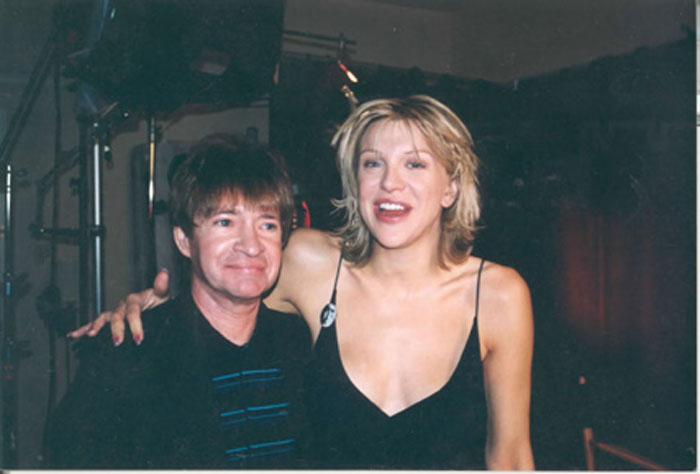Hickenlooper, who braved the turbulent genius of Francis Ford Coppola to make the award-winning Hearts of Darkness: A Filmmaker's Apocalypse, sees Bingenheimer as the perfect embodiment of modern society's relentless obsession with fame and celebrity. For more than four decades, the curious Mr. Bingenheimer has demonstrated a Zelig-like ability to simply show up at crucial junctures in pop cultural history. Dig through any musical archive and you'll see Rodney appearing in the background of just about any star's photo—just like the chameleonic title character of Woody Allen's 1986 film.
So how did this short, soft-spoken and seemingly uncharismatic fellow become the beloved little brother of the entire recording industry?
Hickenlooper gives us the expected historical background, showing us how this shy product of a broken home, a flighty mother and a sheltered Northern California upbringing, was dumped, rather unceremoniously, at the age of 16 on the mean streets of Hollywood and told to make something of himself. Over the course of the next few years, Rodney managed to talk his way into the lives of countless musical superstars. Guilless and briming with enthusiasm for all things musical, Rodney became a fixture of the West Coast music scene throughout the '70s. So, not only do we get Rodney's personal history, but a magical mystery tour through the last 30 years of pop music.
While Hickenlooper is fascinated with Bingenheimer's Andy Warhol-style “fame by association,” he never quite nails the idea of Rodney as a living metaphor for celebrity worship. This portion of the film remains tantalizingly out of focus, either because Hickenlooper just isn't asking hard enough questions or because the answers are all too obvious. Why are we so fascinated with famous people? … Well, because they're famous.
Far more interesting is Rodney's own fading semi-stardom. Driving his mom's run-down Nova, living in a memorabilia-packed apartment, it's clear that the aging Bingenheimer has rarely, of ever, profited from his famous connections. And, although he's “pals” with tons of superstars, it's obvious he has few real friends to hold on to as he becomes increasingly superfluous in the land of “what have you done for us lately” Los Angeles. Rodney's closest friend appears to be a crazed fan pining for musical stardom (while dressed as a spaceman), and the “love of his life” seems barely interested in his presence.
Although he's been instrumental in the careers of countless entertainers, our music-loving hero finds himself increasingly pushed aside by the radio station he made famous. (He currently works the not-so-covetted midnight to 3 a.m. Sunday slot.) In today's corporate rock structure, a DJ who thinks for himself and tries to “break” unknown bands is dangerous. With bubble gum pop and rap metal appealing to the pocketbooks of teenyboppers and skater boys respectively, who the hell cares about rock and roll anyway?
You could view Rodney as the sort of blank-slate, star-worshipping nobody that Hickenlooper occasionally makes him out to be. Or you could view Bingenheimer as a naïve but painfully sincere musical cheerleader who gave up a shot at Fortune to pursue its twin sister, Fame, and is now reaping the sad rewards. Either way, Mayor of the Sunset Strip is a fascinating, funny and bittersweet look at how America disposes of the famous and the not-so-famous.



